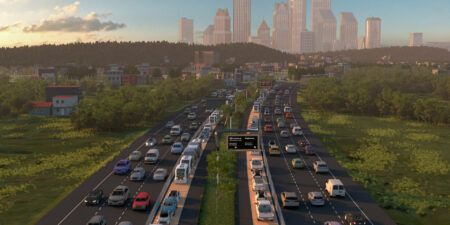Swedish telecommunications multinational Ericsson has initiated the formation of a cross-industry consortium to strengthen 5G research and development in Germany, which will focus on its applications for automated and connected driving.
The 5G-ConnectedMobility consortium is deploying a dedicated 5G test network, operating in the 700MHz waveband, along the A9 motorway and the high speed rail track between Nuremberg and Greding. The 18.6-mile (30km) test route consists of several sections of the ‘Digital Test Field Motorway’, which was set up by the German government as an area where the automotive sector, digital economy, and research institutions can trial pioneering systems and technologies under real-world conditions. The infrastructure has already been completed on the first sections, meaning that live tests can begin immediately.
The project consortium will carry out tests in the areas of vehicle-to-vehicle (V2V), vehicle-to-infrastructure (V2I), digitalization of the railway infrastructure, and other applications, using 5G technology. In particular, the 5G-ConnectedMobility project will use V2X communications to trial new methods of traffic information provision in real time, and cross manufacturer traffic control for automated vehicles.
The members of the consortium are: Ericsson, BMW Deutsche Bahn, the TU Dresden 5G Lab, the Federal Highway Research Institute (BASt), the Federal Regulatory Agency (BNetzA), and all three German mobile network operators, Deutsche Telekom, Telefónica Deutschland, and Vodafone. The project is being supported by the Federal Ministry of Transport and Digital Infrastructure, and the Bavarian Road Construction Administration.
The 5G-ConnectedMobility project will operate within an independent infrastructure, and is not dependent on any commercial network. This means that 5G prototype applications can be installed and tested regularly, in various network configurations, at any time, without restrictions. The dedicated Ericsson 5G mobile network allows live tests of real-time applications, even under extreme network loads, and with very high travel speeds. Test conditions can be created that are hardly ever found in commercially operated live networks.
“With the next mobile network standard 5G, we are firing the starting shot for the digital real-time era, said Alexander Dobrindt, Federal Minister of Transport. “5G is a key technology for automated and connected driving, enabling direct data communication between vehicles and infrastructure. The 5G-ConnectedMobility project will drive forward technology on the digital test field of a motorway. Alongside the high precision radar sensors, which we have installed on the test field, the 5G project is a further milestone on the way to the first fully digitalized and fully networked road.”
Stefan Koetz, chairman of the Ericcson management board, commented, “I am pleased that it has been possible to form such a wide cross industry consortium with 5G-ConnectedMobility. With the members of the telecommunications industry, and the application industry, it will be possible to accelerate 5G research and development beyond Germany, and bring the specific requirements of the various industries in Germany into international 5G standardization activities. This will make Germany stronger in this area.”




